| Srl | Item |
| 1 |
ID:
020810
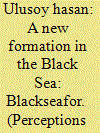

|
|
|
|
|
| Publication |
Dec 2001-Feb 2002.
|
| Description |
97-106
|
|
|
|
|
|
|
|
|
|
|
|
|
|
|
|
| 2 |
ID:
079251
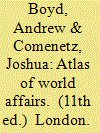

|
|
|
|
|
| Edition |
11th ed.
|
| Publication |
London, Routledge, 2007.
|
| Description |
viii, 254p.Hbk
|
| Standard Number |
9780415391689
|
|
|
|
|
|
|
|
|
|
|
|
Copies: C:1/I:0,R:0,Q:0
Circulation
| Accession# | Call# | Current Location | Status | Policy | Location |
| 052726 | 911/BOY 052726 | Main | On Shelf | General | |
|
|
|
|
| 3 |
ID:
118580
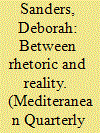

|
|
|
|
|
| Publication |
2012.
|
| Summary/Abstract |
As a powerful littoral state with important security interests in the Black Sea, Russia has the ability to use the maritime domain to advance and protect its interests, which will affect regional and international security. Using the currently available literature, this essay examines the three factors that shape and affect Russia's maritime power in the Black Sea: quantitative factors such as the number and capability of maritime platforms as well as access to maritime infrastructure; qualitative factors such as the morale of maritime personnel; and the strategic context in which Russia exercises its maritime power. It argues that Russian maritime power is likely to decline significantly. Not only will Russia have significantly fewer maritime platforms in the future, but its ability to use the maritime domain will be compromised by qualitative problems and poor relations with the United States and littoral states such as Georgia and Romania.
|
|
|
|
|
|
|
|
|
|
|
|
|
|
|
|
| 4 |
ID:
053494
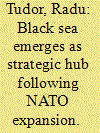

|
|
|
| 5 |
ID:
151908
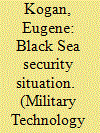

|
|
|
| 6 |
ID:
062481
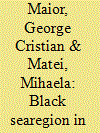

|
|
|
| 7 |
ID:
094364
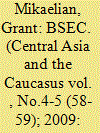

|
|
|
| 8 |
ID:
111112
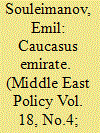

|
|
|
| 9 |
ID:
110151
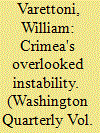

|
|
|
| 10 |
ID:
085568
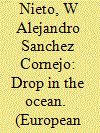

|
|
|
|
|
| Publication |
2008.
|
| Summary/Abstract |
This article discusses Bulgaria's NATO membership; the discussion centers on how Black Sea geopolitics have been altered due to NATO's increasing presence in the area. Furthermore, I discuss in what ways Bulgaria contributes to the NATO alliance by being a member. Finally, the article discusses the effects of the summer 2008 events in Georgia vis-a-vis Black Sea geopolitics. The geographical position and the events occurring around this Southeastern European country have made Bulgaria a strategically important country for the security future of the region
|
|
|
|
|
|
|
|
|
|
|
|
|
|
|
|
| 11 |
ID:
192931
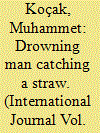

|
|
|
|
|
| Summary/Abstract |
In the mid-2010s Turkey-Russia relations gained a strategic dimension after the two nations began to work together in Syria and took bold steps to cooperate on defence and nuclear energy. This development was commonly regarded as a major shift in Turkish foreign policy. This article argues that the context in which the Turkey-Russia nexus operates is historically rooted. Since the nineteenth century, Russia almost has been the most critical threat to Turkey; and Turkey consistently sought to moderate this threat, mostly with Western assistance. But when Turkey either failed to subdue Russia or there was no significant threat, it would opt for rapprochement with Russia. An examination of the historical background of Turkey-Russia relations helps explain these nations’ contemporary dynamics with one another.
|
|
|
|
|
|
|
|
|
|
|
|
|
|
|
|
| 12 |
ID:
129091
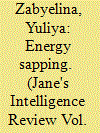

|
|
|
| 13 |
ID:
106156
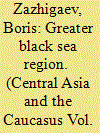

|
|
|
| 14 |
ID:
146859


|
|
|
|
|
| Contents |
Meir Rosenne was one of the last representatives of a remarkable generation of Israeli diplomats who were born in Europe, survived the Holocaust and made the defense of the Jewish State their cause and purpose in life. The son of Jacob and Minna Rosenhaupt, Meir was born in 1931 in Jassy or Iasi, former capital of Moldavia and the capital of Rumania (1916-1918). Jassy was also the center of a thriving Jewish community. During World War II, a third of the community was killed in the worst pogrom of the war in Rumania.
|
|
|
|
|
|
|
|
|
|
|
|
|
|
|
|
| 15 |
ID:
093799
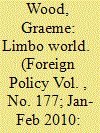

|
|
|
|
|
| Publication |
2010.
|
| Summary/Abstract |
On my recent visit to the Republic of Abkhazia, a country that does not exist, I interviewed the deputy foreign minister,Maxim Gundjia, about the foreign trade his country doesn't have with the real countries that surround it on the Black sea.
|
|
|
|
|
|
|
|
|
|
|
|
|
|
|
|
| 16 |
ID:
092901
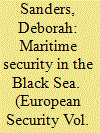

|
|
|
|
|
| Publication |
2009.
|
| Summary/Abstract |
The Black Sea is bordered by three NATO members: Bulgaria, Romania and Turkey, as well as Ukraine, Russia and Georgia and it faces a number of maritime security threats that affect European security. These include direct threats to ships, shipping and maritime personnel as well as threats from the way in which the Black Sea is used for illegal activities by criminals and terrorists. This paper argues that despite the acceptance by NATO that regional maritime security operation performed by littoral states will provide a safe and secure maritime environment in the Black Sea, these serious maritime threats cannot be dealt with effectively by the littoral states. Poor relations between littoral states and lack of investment in maritime capabilities suggest that maritime security cannot be achieved in the Black Sea in the short to medium term. Instead, Black Sea will continue to be a major source of insecurity and instability for Europe.
|
|
|
|
|
|
|
|
|
|
|
|
|
|
|
|
| 17 |
ID:
154889
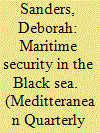

|
|
|
|
|
| Summary/Abstract |
Traditional maritime security challenges have returned to the Black Sea, and this has had a negative effect on the ability of the six littoral states to address newer security challenges. Traditional maritime security challenges include the buildup of Russian forces in Crimea, the return of conflict to the shores of the Black Sea, uncertainty over the demarcation of maritime borders, and strained relations between Turkey and Russia. As a result, newer and no less important maritime security challenges have, in effect, been pushed off the agenda.
|
|
|
|
|
|
|
|
|
|
|
|
|
|
|
|
| 18 |
ID:
129414
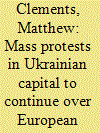

|
|
|
| 19 |
ID:
181876
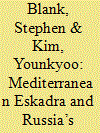

|
|
|
|
|
| Summary/Abstract |
Russia seeks to convert the Black Sea into a Russian lake. This entails projecting power well into the Mediterranean Sea. Since 2013 Moscow has reinforced the missile, air defence, and submarine component of its Mediterranean Eskadra (Squadron) to deny NATO access to the Eastern Mediterranean and Black Seas. This article explains how and why Russia's Mediterranean Eskadra has become a major arm of Russia's military-political strategy in these waters. By analysing its missions, roles, and activities the article shows how Moscow conducts innovative, sophisticated, yet simultaneously traditional military-political operations to maximise and enhance its global standing in accordance with its own strategy. The article further argues that the Eskadra's creation and deployment corresponds not just to the revival of Russian military capability in 2013, but also to a much broader Russian perspective on contemporary war, and analyzes Russia's political considerations in the deployment of major military forces in the Mediterranean Basin.
|
|
|
|
|
|
|
|
|
|
|
|
|
|
|
|
| 20 |
ID:
097784
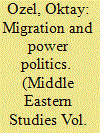

|
|
|
|
|
| Publication |
2010.
|
| Summary/Abstract |
This study is an examination of the relationship between migration and politics, focusing on the case of Georgian immigrants settled in the central Black Sea districts of Ottoman Turkey during the last quarter of the nineteenth century. Based on the extensive use of Ottoman and British archival material as well as interviews conducted in the region, the study reveals insights into the intriguing power politics behind migration in the Ottoman Empire. Scrutinizing certain characteristics of the settlement process, it also demonstrates the complex imperial network of power that linked the most distant border districts of the Batum-Curuksu (modern Kobuleti) region of Ottoman Caucasus directly to Istanbul via the Black Sea region of Ordu. The central argument of the study is that the leader of the immigrant group, namely Curuksu Ali Pasha, not only successfully managed the settlement process of his fellow Georgians but also masterfully manipulated all the stages of migration and settlement, making use of the conditions in his fierce power struggle against the appointed Ottoman governors as well as the native Muslim nobility of the region. The study thus shows how the personal agenda and the central position of a local Pasha in such a struggle for domination can dangerously destabilize life in an Ottoman province and sow the seeds of animosity between the immigrant community and the natives that eventually accelerated into warfare in the 1890s, creating a serious 'Immigrant Problem', the legacy of which lasted up to the early Republican period.
|
|
|
|
|
|
|
|
|
|
|
|
|
|
|
|